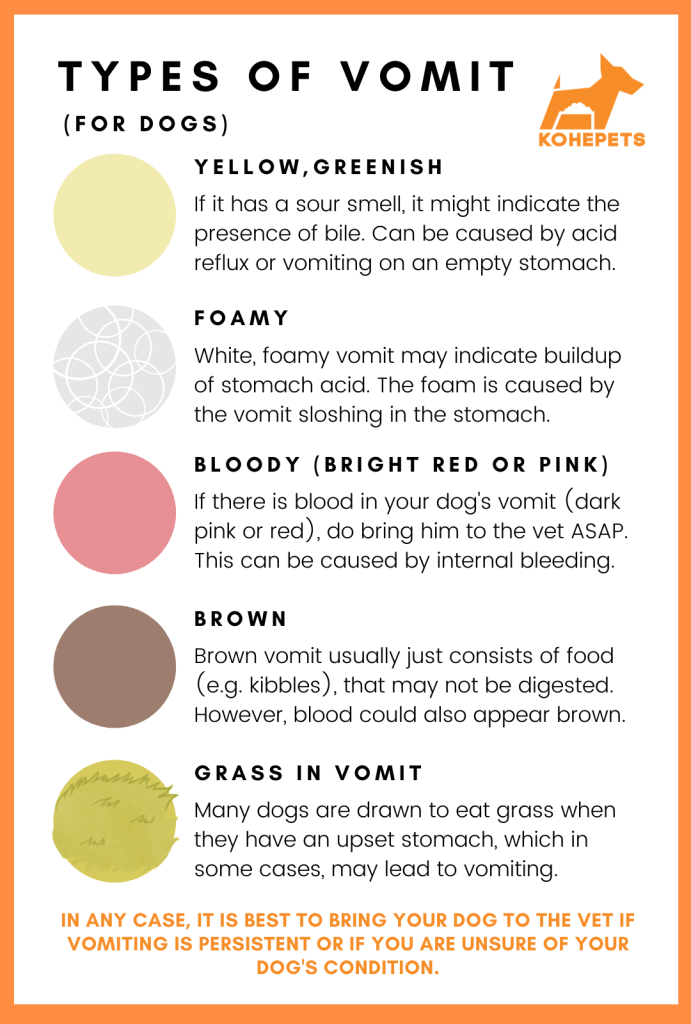Just like other common symptoms, such as diarrhea or a lack of appetite, vomiting in dogs might or might not be a sign of something more serious. Similar to humans, dogs can also get upset stomachs from time to time which might lead to vomiting.
In this article, we will help provide some insight into why your dog might be vomiting, and when you should probably get him or her checked by the vet.
Vomiting In Dogs — Vomiting or Regurgitation?

Vomiting and regurgitation have very different causes as well as treatments. However, they can be easily mistaken for each other as they both involve food/liquid coming up the esophagus.
If you suspect your dog has vomited, make sure you look for partially digested food with some bile in the vomit. This usually happens when food or liquid from the stomach or upper small intestines are forcefully expelled and thrown up. Just like us, dogs might feel nauseous before they vomit. It may also be coupled with other signs such as drooling, excessive swallowing and retching.
Meanwhile, regurgitation is usually just undigested food that is thrown up without bile. The food consumed did not reach the stomach, and there wouldn’t be any abdominal heaving or contractions. This usually happens after mealtimes, if your dog ate too much, ate too fast, got too excited or too stressed out.
Common Types Of Vomit
The colour of vomit can vary, depending on a number of factors such as the cause of vomiting or the food your dog has recently eaten. Although it can provide a clue to the reason why your dog is vomiting, due to the large number of factors that can affect the colour of vomit, it is not a reliable source to help determine the underlying condition.

Causes Of Vomiting In Dogs

There are a number of reasons why your dog may be throwing up. Here are some of the common causes of vomiting in dogs:
Eating Too Quickly/Too Much
If your dog is eating too fast or not properly chewing their food, it can cause them to vomit due to indigestion. You can consider dividing one big meal into multiple small portions or getting slow-feeders.
In addition, overfeeding can also lead to vomiting. Dogs can’t always sense when they are full, so if they accidentally get into their food stash or a broken bag of kibble, they are most likely going to keep eating. This may also apply to multi-dog households, where one dog might be eating another’s share.
Abrupt Change In Diet
Have you recently changed your dog’s food? Sudden changes in diet can sometimes cause vomiting. It is recommended to slowly transition into new diets through gradually increasing the percentage of new food to their old food so their bodies have sufficient time to become accustomed to it. It is also always wise to discuss any diet changes with your veterinarian.
Motion Sickness
Similar to the way we get motion sickness, our dogs can also feel nauseous when traveling. This is especially so for dogs who are anxious about travelling. In such situations, you can speak with your vet to see how this can be treated. If possible, limit their car rides to help prevent motion sickness. Do not give your pet any over the counter medications for motion sickness without consulting your vet.
However, if you think your dog might be vomiting due to the stress of travelling, you might want to try getting them a ThunderShirt or use an anxiety-reducing spray in your car to help them feel a little better. You can check out ‘Dealing With Anxiety In Dogs’ to find out more.
Post-Surgical Vomiting
Your dog may experience some vomiting or nausea after a surgical procedure. In such cases, your vet might have prescribed medication to help treat some of the symptoms. However, if your dog is still vomiting excessively after a procedure, you should contact your vet as soon as possible.
Food Intolerance
Dogs can also have fussy stomachs, just as their human counterparts. Dogs do not handle fatty foods very well and most are lactose-intolerant. If your dog experiences diarrhea, flatulence or vomiting, try to limit those items from their diet, especially if you occasionally feed them food you’re eating.
Other Causes
The following are some of the more serious reasons why your dog may be vomiting. Consult your vet immediately if your dog is vomiting excessively to determine if it is one of the following causes.
- Accidental ingestion of a foreign object or toxic substance
- Dietary allergies
- Gastroenteritis
- Heatstroke
- Inflammatory bowel disease (IBS)
- Metabolic diseases, such as kidney or liver failure, diabetes etc.
- Stomach bloat
- Cancer
- Viral or bacterial infection
Vomiting In Dogs — When To Take Them To The Vet

If your dog vomits once or twice and is acting otherwise fine, it is most likely not a serious issue. However, if your dog is exhibiting any of the following symptoms in addition to vomiting, you should seek immediate veterinary care:
- Chronic or frequent vomiting
- Changes in bowel movements or urination patterns
- Diarrhea
- Dehydration (look for dry gums and try the skin tenting test)
- Bloating or enlarged abdomen
- Lack of energy
- Loss of appetite
- Unable to keep water down
- Sudden weight loss
- Retching/dry heaving without vomiting
- Vomiting blood
- Vomits part of a foreign object or an entire object
- Seizures
- Collapse
However, if your dog doesn’t show these symptoms but is a puppy, is geriatric (a senior dog), has pre-existing medical conditions or if you suspect they have eaten something harmful, do still pay your vet a visit as soon as possible.
Treatment For Vomiting In Dogs

If vomiting is an isolated incident, you don’t have to call your vet. However, if your dog experiences one or more of the above symptoms, and is vomiting repeatedly, you should seek medical attention, as it could potentially save your dog’s life.
The course of treatment implemented by your vet would depend on the underlying cause. If serious, your vet might perform diagnostic tests such as x-rays, blood work, fecal analysis, endoscopy or even an abdominal ultrasound. They will use these results to determine if any additional tests are needed, such as a biopsy.
Treatments vary according to the diagnosis. For example, stomach issues such as gastroenteritis are usually resolved with anti-nausea medication and a bland diet.
In addition, more serious health conditions may require temporary hospitalization for fluids, surgery or other procedures. You should be upfront and honest with your vet and follow their directions for treatment precisely.
Other treatments for vomiting in dogs include fighting off dehydration. You may have to give your dog small amounts of water every hour or so ensure they are well-hydrated. In addition, your vet may advise you to keep your dog from eating for a few hours to allow his or her stomach to recover. Never allow your pet to fast without first speaking with your vet beforehand.
For more health-related articles, check out ‘Human Foods That Are Harmful To Cats & Dogs‘ or ‘Dietary Fiber For Dogs — Is It Necessary?‘.







